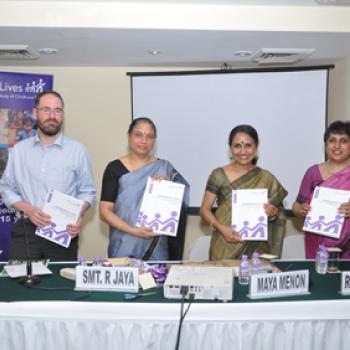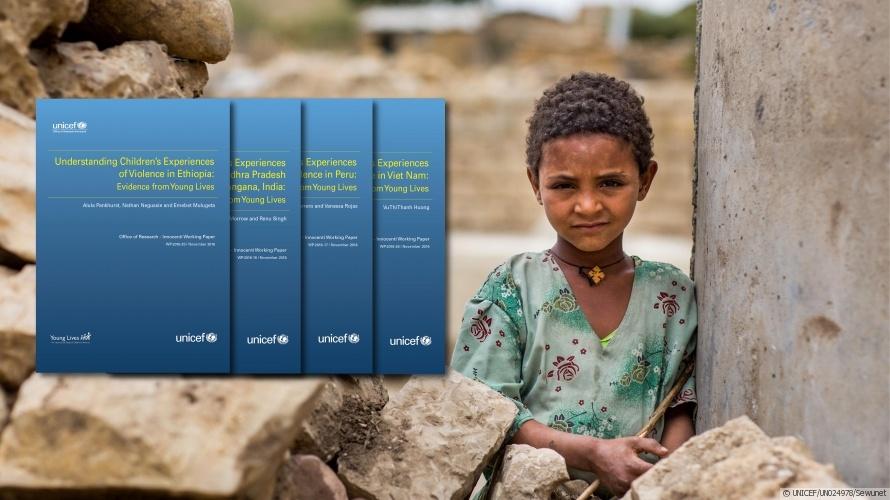
Raising quality across the board, greater accountability mechanisms and ensuring children are not segregated by sector are essential if India is to deliver the quality education required under Education for All commitments, according to Dr Renu Singh, Young Lives India Country Director and co-author of a report on teaching quality: Teaching Quality Counts: How Student Outcomes Relate to Quality of Teaching in Private and Public Schools in India.
This latest publication from Young Lives was released by Ms R. Jaya, (IAS) Member Secretary, National Council for Teacher Education, Government of India, on 26 February 2013 at the India Habitat Centre, New Delhi.
The paper highlighted that parents perceive private schools as providing better-quality education and are therefore opting to send their children to the ?low-fee? private schools that are mushrooming across both rural and urban locations in Andhra Pradesh, even though they may have to make significant sacrifices to do so. Between 2006 and 2009 the number of children in private primary schools increased by 8% and by 7% for older children in private secondary schools.
However, Dr Singh said, ?Private schools may be considered better than government schools, but ?better? should not be perceived as ?good?.?
The launch, attended by 25 stakeholders and chaired by Dr Paul Dornan, Senior Policy Officer, Young Lives International, began with a welcome address by Mr Colin Bangay, Senior Education Advisor, DFID. ?DFID is very proud to be involved with Young Lives,? he said, noting the richness of the Young Lives study which captures many childhood experiences and covers many dynamics.
The paper?s key findings were then presented by Dr Singh and co-author Ms Sudipa Sarkar, Young Lives Research Associate. Their presentation revealed that children enrolled in low-fee charging private schools achieved better scores in mathematics, despite better-qualified and more experienced teachers being available in government schools.
However, private school enrolment is ridden with socio-economic, gender and caste gaps. It is also apparent that while the rapidly growing private sector is labelled ?low-fee?, these costs can be very significant and a barrier for many poorer families. Inequalities prevail, with 70% of more advantaged Other Castes children enrolled in private schools. Plus gender gaps are widening: in 2002 boys were 4 percentage points more likely to be enrolled in private schools than girls but this had increased to 13 percentage points by 2009. Also, quality and governance standards are variable.
Dr Singh stressed, ?Quality varies across schools and a lot depends on leadership in schools. Benchmarks and regulatory mechanisms need to be developed and implemented for quality assurance in both government and private schools. One way to achieve this would be to create an autonomous body for assessment of schools and learning levels of children in every state. This information should be in the public domain to foster greater accountability of schools both government and private. What the teacher ?does? in the classroom is more important than what the teacher ?knows??.
The authors? presentation was followed by comments from the panel. Ms Maya Menon, Founder Director, The Teacher Foundation, began by saying: ?Teachers need training in classroom realities, not just educational theories.?
Next the Chief Guest, Ms Jaya, first congratulated Young Lives on the wealth of its information and data available in the public domain . She commented that Diploma in Education (D.Ed) and Diploma in Learning Education (D.L.Ed) qualified teachers are better suited to teach younger children than teachers who have achieved a Bachelor in Education (B.Ed) or Masters in Education (M.Ed) degree. She added the caveat that a teacher?s knowledge of the subject is as important as their pedagogical knowledge.
The Guest of Honour, Mr Harsh Mander, Member, National Advisory Council, Government of India, and Director, Centre for Equity Studies, New Delhi, concluded by saying that it is important to hold on to the requirement for professionally qualified teachers and to examine deeply the content of teaching training programmes.
The panel?s comments were followed by a lively interactive session. At the end, Dr Singh thanked the panel and the participants for sharing their views and engaging actively in the day?s discussion.
She concluded by saying, ?Parents are making tremendous sacrifices in order to enable their children to have better life than their own. It is imperative that the education system be reformed to meet this demand, by investing in and training an effective teaching force and by introducing a monitoring system to ensure accountability.?
Â


Raising quality across the board, greater accountability mechanisms and ensuring children are not segregated by sector are essential if India is to deliver the quality education required under Education for All commitments, according to Dr Renu Singh, Young Lives India Country Director and co-author of a report on teaching quality: Teaching Quality Counts: How Student Outcomes Relate to Quality of Teaching in Private and Public Schools in India.
This latest publication from Young Lives was released by Ms R. Jaya, (IAS) Member Secretary, National Council for Teacher Education, Government of India, on 26 February 2013 at the India Habitat Centre, New Delhi.
The paper highlighted that parents perceive private schools as providing better-quality education and are therefore opting to send their children to the ?low-fee? private schools that are mushrooming across both rural and urban locations in Andhra Pradesh, even though they may have to make significant sacrifices to do so. Between 2006 and 2009 the number of children in private primary schools increased by 8% and by 7% for older children in private secondary schools.
However, Dr Singh said, ?Private schools may be considered better than government schools, but ?better? should not be perceived as ?good?.?
The launch, attended by 25 stakeholders and chaired by Dr Paul Dornan, Senior Policy Officer, Young Lives International, began with a welcome address by Mr Colin Bangay, Senior Education Advisor, DFID. ?DFID is very proud to be involved with Young Lives,? he said, noting the richness of the Young Lives study which captures many childhood experiences and covers many dynamics.
The paper?s key findings were then presented by Dr Singh and co-author Ms Sudipa Sarkar, Young Lives Research Associate. Their presentation revealed that children enrolled in low-fee charging private schools achieved better scores in mathematics, despite better-qualified and more experienced teachers being available in government schools.
However, private school enrolment is ridden with socio-economic, gender and caste gaps. It is also apparent that while the rapidly growing private sector is labelled ?low-fee?, these costs can be very significant and a barrier for many poorer families. Inequalities prevail, with 70% of more advantaged Other Castes children enrolled in private schools. Plus gender gaps are widening: in 2002 boys were 4 percentage points more likely to be enrolled in private schools than girls but this had increased to 13 percentage points by 2009. Also, quality and governance standards are variable.
Dr Singh stressed, ?Quality varies across schools and a lot depends on leadership in schools. Benchmarks and regulatory mechanisms need to be developed and implemented for quality assurance in both government and private schools. One way to achieve this would be to create an autonomous body for assessment of schools and learning levels of children in every state. This information should be in the public domain to foster greater accountability of schools both government and private. What the teacher ?does? in the classroom is more important than what the teacher ?knows??.
The authors? presentation was followed by comments from the panel. Ms Maya Menon, Founder Director, The Teacher Foundation, began by saying: ?Teachers need training in classroom realities, not just educational theories.?
Next the Chief Guest, Ms Jaya, first congratulated Young Lives on the wealth of its information and data available in the public domain . She commented that Diploma in Education (D.Ed) and Diploma in Learning Education (D.L.Ed) qualified teachers are better suited to teach younger children than teachers who have achieved a Bachelor in Education (B.Ed) or Masters in Education (M.Ed) degree. She added the caveat that a teacher?s knowledge of the subject is as important as their pedagogical knowledge.
The Guest of Honour, Mr Harsh Mander, Member, National Advisory Council, Government of India, and Director, Centre for Equity Studies, New Delhi, concluded by saying that it is important to hold on to the requirement for professionally qualified teachers and to examine deeply the content of teaching training programmes.
The panel?s comments were followed by a lively interactive session. At the end, Dr Singh thanked the panel and the participants for sharing their views and engaging actively in the day?s discussion.
She concluded by saying, ?Parents are making tremendous sacrifices in order to enable their children to have better life than their own. It is imperative that the education system be reformed to meet this demand, by investing in and training an effective teaching force and by introducing a monitoring system to ensure accountability.?
Â


